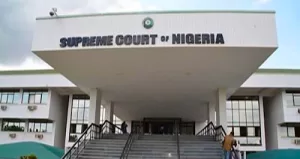A hearing of the Nigerian government’s appeal filed at the Supreme Court, contesting the release of the leader of the Indigenous People of Biafra (IPOB), Nnamdi Kanu, has been postponed.

The hearing was postponed by the Supreme Court on Thursday, April 27.
Now, the hearing will hold on May 11.
A five-member Supreme Court bench chaired by John Okoro is to hear the appeal.
The Nigerian government had accused Mr. Kanu of terrorism and treasonable crime, but the accusations were dismissed on October 13, 2022 by the Court of Appeal in Abuja.
The government was consequently told to release the IPOB leader by the appellate court.
However, the government filed an appeal with the Supreme Court in an effort to overturn the appellate court’s decision to release Mr. Kanu.
It also got a court order requiring Mr. Kanu to be reminded while the Supreme Court considers its appeal.
Nnamdi Kanu’s Trial
Six months after the Court of Appeal ruled that Mr. Kanu should be freed, the apex court for the first time heard the government’s appeal.
Mr Ozekhome blamed the Federal Government for the delay in hearing the suit.
He said the government filed its notice of appeal without filing the necessary accompanying documents.
“For instance, the federal government filed a motion (request) for extension of time to file appellant’s brief, but the motion was not served on us (the defence).” Mr Ozekhome told journalists shortly after Thursday’s hearing.
In June 2021, the Nigerian government forcibly deported Mr. Kanu from Kenya so he could stand trial in Abuja on terrorism-related charges.
The IPOB leader was later re-arrested on a 15-count terrorism charge before Binta Nyako of the Federal High Court in Abuja.
But on April 8, the judge dismissed eight of the fifteen counts in response to Mr. Kanu’s preliminary objection, which disputed the accuracy of the indictment.
People Also Read: Adamawa: Court Dismisses Binani’s Suit Challenging INEC
The IPOB leader appealed against Ms Nyako’s ruling at the Court of Appeal.
Mr. Ozekhome, Mr. Kanu’s attorney, claimed that his client was “illegally extradited from Kenya”.
He requested that the other 8 counts of the accusation be dropped because they violated Mr. Kanu’s fundamental right to freedom.
Violation Of Extradition Treaty
The defence attorney claimed that Mr. Kanu’s extradition broke both international and Nigerian extradition regulations.
The Court of Appeal upheld Mr. Ozekhome’s reasoning in its verdict on the case.
Jummai Sankey, the chair of the Court of Appeal panel, declared that the lower court “lacks the jurisdiction to entertain the suit”.
The court determined that Mr. Kanu’s extraordinary extradition from Kenya to Nigeria in June 2021 without adhering to the extradition rules constituted a gross violation of Nigeria’s extradition treaty.
Also, it was considered a violation of the IPOB leader’s basic human rights.
However, the government obtained an order from the Court of Appeal staying the execution of its earlier order, freeing Mr Kanu.
Court Hearing On Thurday
Mike Ozekhome, Mr. Kanu’s main attorney, notified the panel of various motions pertaining to Mr. Kanu’s bail and “deteriorating” health at the start of the Supreme Court hearing on Thursday.
The Professor of law and Senior Advocate of Nigeria (SAN), Mr. Ozekhome, requested that the court should either give the IPOB leader bail or order his transfer to the Kuje Correctional Centre in Abuja so that he would be conveniently available while the substantive appeal was heard and decided.
Mr Kanu is being held at the State Security Service (SSS) detention facility in Abuja.
Tijjani Gazali, a SAN who represents the Nigerian government, contended that the SSS prison centre has the necessary means to take care of Mr. Kanu’s medical needs in contrast to Mr. Ozekhome’s requests.
The panel instructed Mr. Ozekhome to withdraw his petitions after hearing the arguments in order to allow for a prompt hearing of the main lawsuit.
Also, within six days starting on Thursday, it ordered Mr. Gazali to submit the appellant’s brief.
John Okoro, Emmanuel Agim, Tijjani Abubakar, Uwani Abba-Aji, and Ibrahim Saulawa made up the court’s panel.

